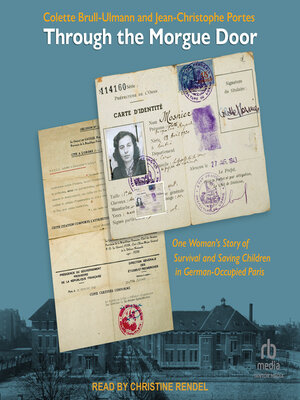Through the Morgue Door
audiobook (Unabridged) ∣ One Woman's Story of Survival and Saving Children in German-Occupied Paris
By Colette Brull-Ulmann

Sign up to save your library
With an OverDrive account, you can save your favorite libraries for at-a-glance information about availability. Find out more about OverDrive accounts.
Find this title in Libby, the library reading app by OverDrive.



Search for a digital library with this title
Title found at these libraries:
| Library Name | Distance |
|---|---|
| Loading... |
In 1934, at the age of fourteen, Colette Brull-Ulmann knew that she wanted to become a pediatrician. By 1942, Brull-Ulman and her family had become registered Jews under the ever-increasing statutes against them enacted by Petain's government. Her father had been arrested and interned at the Drancy detention camp and Brull-Ulman had become an intern at the Rothschild Hospital.
Under Claire Heyman, a charismatic social worker who was a leader of the hospital's secret escape network, Brull-Ulmann began working tirelessly to rescue Jewish children treated at the Rothschild. Ultimately, Brull-Ulmann was forced to flee the Rothschild in 1943, when she joined her father's resistance network, gathering and delivering information for De Gaulle's secret intelligence agency until the Liberation in 1945.
In 1970, Brull-Ulmann finally became a licensed pediatrician. It wasn't until decades later when she finally started to speak publicly—not only about her own work and survival, but about the one child who affected her most deeply. Originally published in French in 2017, Brull-Ulmann's memoir fearlessly illustrates the horrors of Jewish life under the German Occupation and casts light on the heretofore unknown story of the Rothschild Hospital during this period.
Under Claire Heyman, a charismatic social worker who was a leader of the hospital's secret escape network, Brull-Ulmann began working tirelessly to rescue Jewish children treated at the Rothschild. Ultimately, Brull-Ulmann was forced to flee the Rothschild in 1943, when she joined her father's resistance network, gathering and delivering information for De Gaulle's secret intelligence agency until the Liberation in 1945.
In 1970, Brull-Ulmann finally became a licensed pediatrician. It wasn't until decades later when she finally started to speak publicly—not only about her own work and survival, but about the one child who affected her most deeply. Originally published in French in 2017, Brull-Ulmann's memoir fearlessly illustrates the horrors of Jewish life under the German Occupation and casts light on the heretofore unknown story of the Rothschild Hospital during this period.







